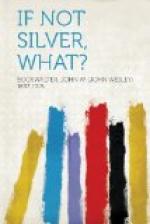Some curious and a few amusing results followed. Among a certain class in England a regular panic broke out, and in Holland and Belgium even the masses of the people became suspicious of gold and disliked to take it in payment. In the latter country a few traders hung out signs to attract customers, to this effect, “L’or est recu sans perte,” meaning that gold money would be taken there without a discount. It is probably not known to one American in a thousand that the practice of inserting a silver clause in contracts became at that time so common in Europe that it was actually transferred to the United States, and in England life insurance companies were established on a silver basis. Several American corporations stipulated for payment in silver, especially of rents, and to this day a New England establishment is receiving a certain number of ounces of fine silver yearly under leases then drawn up.
It is equally interesting to note in the literature of that period arguments against gold almost word for word like those now used against silver. The financial managers threw gold out of use and then urged its non-use as a reason for its demonetization. “None in circulation,” “variation shows impossibility of bimetallism”—such were the phrases then applied to gold, as we now find them applied to silver. An artificial disturbance was created, and then pleaded as a reason for further disturbance.
All this while the financiers of England were bombarded with arguments and prophecies of evil, but her geologists pointed out clearly that Australian and Californian products were almost entirely from the washing of alluvial sands and consequently must be very temporary. Her statesmen believed the geologists rather than the panic-stricken financiers, and so she held for gold monometallism.
But it is to France that the world is indebted for maintaining the parity through those years of alarm and panic. M. Chevalier urged upon French statesmen the importance of returning to the system which had been in force previous to 1785, when silver was the standard and gold was rated to it by a law or proclamation. The proposition was actually brought forward in Council and urged upon the Emperor that silver should be made the standard and gold re-rated in proportion to it every six months. The net result was, by France taking in gold and letting out silver, that in 1865 that country had a larger stock of gold than any other in Europe. Suffice it to repeat that several nations, including seventy million people, actually demonetized gold, deprived it of its legal tender, and treated it as a ratable commodity; while France, single-handed and alone upon the continent of Europe, was able to absorb the enormous surplus of gold and maintain the parity by the simple process of keeping her mints open to both at the ancient ratio.




